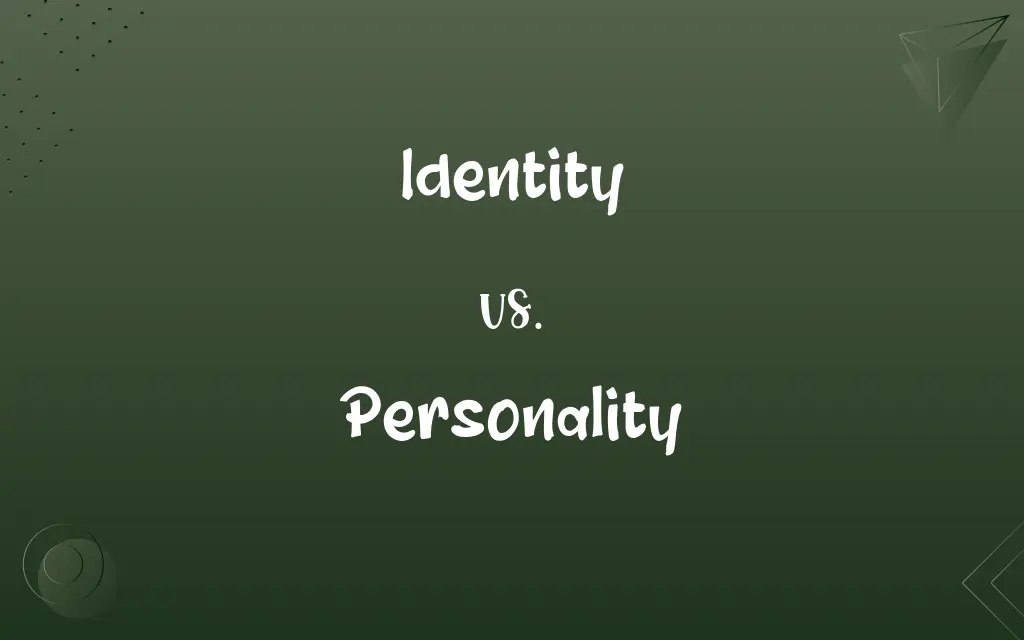Have you ever wondered what truly makes you, *you*? Is it the unique blend of traits that shape your interactions with the world, or is it the deeply personal narratives you weave around yourself? This fundamental question takes us to the heart of a captivating psychological debate: **personality vs. identity**. These concepts, often intertwined and blurred in our everyday understanding, hold distinct meanings that inform how we perceive ourselves and relate to others.

Image: www.taylorfrancis.com
Understanding the differences between personality and identity is crucial for self-discovery, navigating relationships, and ultimately, living a fulfilling life. This guide will delve into the intricate nuances of these two concepts, exploring their origins, how they intertwine, and their lasting impact on our lives.
Defining the Concepts
Personality: The Building Blocks of Behavior
Personality refers to the relatively stable and enduring patterns of thoughts, feelings, and behaviors that distinguish one person from another. It’s the unique blend of traits that influence how we approach the world, making us react to situations in characteristic ways. Think of it as a foundational structure upon which our actions, reactions, and even choices are built.
For centuries, psychologists have sought to understand the complexities of personality. From the pioneering work of Hippocrates, who identified four temperament types, to the more sophisticated models developed in the 20th century, personality theories have evolved to capture the intricate nuances of human behavior. Some prominent models, like the “Big Five” personality traits (openness, conscientiousness, extraversion, agreeableness, and neuroticism), offer valuable insights into how these fundamental dimensions shape our interactions.
Identity: The Narratives We Craft
Unlike personality, identity is not a fixed construct but rather a fluid and multifaceted concept. It encompasses the sense of self that we build through our experiences, relationships, beliefs, and aspirations. Think of identity as a dynamic tapestry woven from various threads representing our cultural background, personal values, defining memories, and life goals.
Identity is a powerful force in our lives, guiding our choices, shaping our perspectives, and influencing how we connect with the world around us. It’s not only shaped by internal factors but also by external influences. Our social groups, cultural norms, and even media portrayals contribute to the narratives we create around ourselves.

Image: differencebtw.com
A Closer Look at the Interplay
While personality and identity are distinct concepts, they work in tandem to create a cohesive sense of self. Personality provides the raw materials, the building blocks for our behavior, while identity provides the framework, the narrative that makes sense of these actions and experiences.
Imagine a builder working on a project: Personality represents the bricks, cement, and other materials used in construction, while identity is the blueprint, the overarching plan that guides the construction process. Both are indispensable for creating a finished structure.
For instance, someone with a naturally outgoing and sociable personality might develop an identity as a “life of the party” based on their interactions and the feedback they receive from others. Similarly, a person with a more introverted personality might gravitate towards a solitary identity, choosing hobbies and activities that align with their preferences.
The Impact on Our Lives
The interplay between personality and identity plays a significant role in shaping our lives in various ways:
- Relationship dynamics: The way we relate to others is influenced by both our personality traits and the identities we present. Our personality might predispose us towards certain behaviors, but it is our identity that influences how we perceive and interpret interactions, affecting the dynamics of our relationships.
- Career choices: Our personality, with its inherent predispositions, and our identity, with its aspirations and values, both contribute to career choices. Some may gravitate towards careers that align with their natural talents and strengths, while others may choose paths that resonate with their long-term goals and personal values.
- Self-esteem and well-being: A strong sense of identity, built on acceptance and self-knowledge, can contribute to higher self-esteem and overall well-being. Conversely, a perceived mismatch between personality and one’s constructed identity can lead to internal conflict and a sense of alienation.
Navigating the Shifting Sands
While personality remains relatively stable over time, identity is more fluid and dynamic. Our interactions, experiences, and evolving perspectives constantly shape and reshape the narratives we create about ourselves. This fluidity allows for personal growth and adaptability, as we navigate the ever-changing landscapes of life.
Recognizing that identity is not fixed but rather a continuously evolving process allows us to embrace change, explore new facets of ourselves, and adjust our narratives as we grow and learn. It encourages us to remain open to new experiences, challenge our assumptions, and re-evaluate our values and beliefs.
Personality Vs Identity
Conclusion: Embracing the Journey
The concepts of personality and identity are fundamental to understanding ourselves and navigating the world around us. By recognizing their distinct meanings and the intricate interplay between them, we gain valuable insights into how we function, relate to others, and ultimately live our lives. This journey of self-discovery is ongoing, a continuous process of exploration and refinement.
As we embrace the fluidity of identity, acknowledge the inherent strengths within our personalities, and remain open to change, we unlock the potential for personal growth, self-acceptance, and fulfilling connections. It’s an exciting and rewarding journey that encourages us to continually strive for a deeper understanding of who we truly are.






